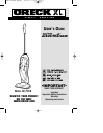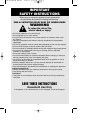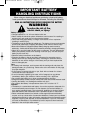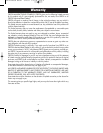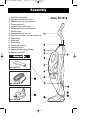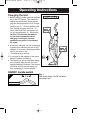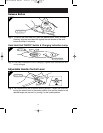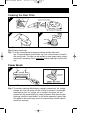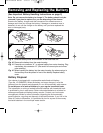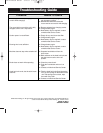
When using an electrical appliance containing a lead-acid battery,
basic precautions should always be followed, including the following:
READ ALL INSTRUCTIONS BEFORE CHARGING THE BATTERY
WARNING
To reduce the risk of fire,
electric shock, or injury:
IMPORTANT BATTERY
HANDLING INSTRUCTIONS
Battery Charging
• Charge batteries for 10 -12 hours before inital use.
• Never modify the electrical system. Alterations could cause a fire resulting in
serious injury and could also ruin the electrical system.
• Use of the wrong type battery or charger could cause a fire or explosion
resulting in serious injury.
• The battery must be handled by adults only. The battery is heavy and contains
sulfuric acid (electrolyte). Dropping the battery could result in serious injury.
• Never allow children to charge the battery. Battery charging must be done by
adults only. A child could be injured by the electricity involved in charging the battery.
• Never lift or carry the battery by the wires or connector. This can damage the
battery and possibly cause a fire resulting in serious injury. Lift and carry the
battery by the case only.
• Read the safety instructions on the battery.
• Examine the battery, charger and their connectors for excessive wear or
damage each time you charge the battery. If damage or excessive wear is
detected, do not use the charger or the battery until you have replaced the
worn or damaged part.
Care
• If a battery leak develops, avoid contact with the leaking acid and place the
damaged battery in a plastic bag. Please refer to the information on this page
for proper disposal.
• If acid comes in contact with skin or eye, flush with cool water for at least
15 minutes and call a physician.
• If acid is internally ingested, give water, milk of magnesia or egg whites
immediately. Never give emetics or induce vomiting. Call a physician.
• Do not allow the battery to run down completely before charging.
• Charge the battery at least once per month, even if the vacuum has not been used.
• Leaving the battery in a discharged condition will ruin it.
• Do not store the battery in temperatures above 75°F or below -10° F.
Disposal
• The battery is a sealed lead-acid battery. It must be recycled or disposed of in
an environmentally sound manner. Do not dispose of a lead-acid battery in
your regular household trash. The incineration, landfilling or mixing of sealed
lead-acid batteries with household trash is prohibited by law in most areas.
• Return exhausted batteries to a federal or state approved lead-acid battery
recycler, such as a local seller of automotive batteries. Contact your local waste
management officials for other information regarding the environmentally sound
collection, recycling and disposal of lead-acid batteries. If you live in the State
of Florida or Minnesota, it is prohibited by law for anyone to throw lead-acid
batteries in the municipal waste stream.
2
ElectrikBroom Manual 2/19/03 3:44 PM Page 7



